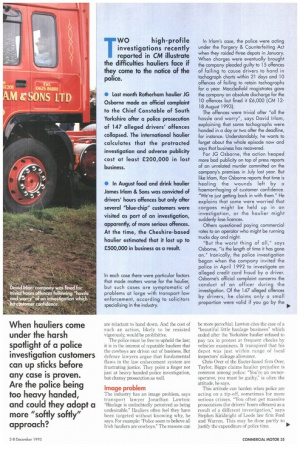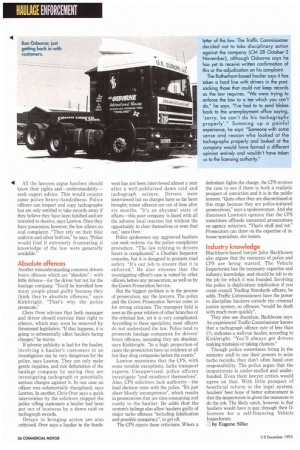T wo high-profile
Page 37

Page 38

If you've noticed an error in this article please click here to report it so we can fix it.
investigations recently reported in CM illustrate the difficulties hauliers face if they come to the notice of the police.
• Last month Rotherham haulier JG Osborne made an official complaint to the Chief Constable of South Yorkshire after a police prosecution of 147 alleged drivers' offences collapsed. The international haulier calculates that the protracted investigation and adverse publicity cost at least £200,000 in lost business.
• In August food and drink haulier James Ham & Sons was convicted of drivers' hours offences but only after several "blue-chip" customers were visited as part of an investigation, apparently, of more serious offences. At the time, the Cheshire-based haulier estimated that it lost up to 000,000 in business as a result.
In each case there were particular factors that made matters worse for the haulier, but such cases are symptomatic of problems at large with transport law enforcement, according to solicitors specialising in the industry.
In Irlam's case, the police were acting under the Forgery & Counterfeiting Act when they raided three depots in January. When charges were eventually brought the company pleaded guilty to 15 offences of failing to cause drivers to hand in tachograph charts within 21 days and 10 offences of failing to retain tachographs for a year. Macclesfield magistrates gave the company an absolute discharge for the 10 offences but fined it £6,000 (CM 1218 August 1993).
The offences were trivial after "all the hassle and worry", says David Iclam, explaining that some tachographs were handed in a day or two after the deadline, for instance. Understandably, he wants to forget about the whole episode now and says that business has recovered.
For JG Osborne, the action heaped more bad publicity on top of press reports of an unrelated murder committed on the company's premises in July last year. But like Iclam, Ron Osborne reports that time is healing the wounds left by a haemorrhaging of customer confidence. "We're just getting back in with them." He explains that some were worried that cargoes might be held up in an investigation, or the haulier might suddenly lose licences.
Others questioned paying commercial rates to an operator who might be running trucks doy and night.
"But the worst thing of all," says Osborne, "is the length of time it has gone on." Ironically, the police investigation began when the company invited the police in April 1992 to investigate an alleged credit cord fraud by a driver. Osborne's official complaint concerns the conduct of an officer during the investigation. Of the 147 alleged offences by drivers, he claims only a small proportion were valid if you go by the 0. letter of the law. The Traffic Commissioner decided not to take disciplinary action against the company (CM 28 October-3 November), although Osborne says he has yet to receive written confirmation of this or the adjudication on his complaint.
The Rotherham-based haulier says it has taken a hard line with drivers in the past, sacking those that could not keep records as the law requires. "We were trying to enforce the law to a tee which you can't do," he says. "I've had to to send blokes back to the unemployment office saying, 'sorry, he can't do his tachographs properly'." Summing up a painful experience, he says: "Someone with some sense and reason who looked at the tachographs properly and looked at the company would have formed a different opinion entirely and wouldn't have taken usto thp licensina authority."




















































































